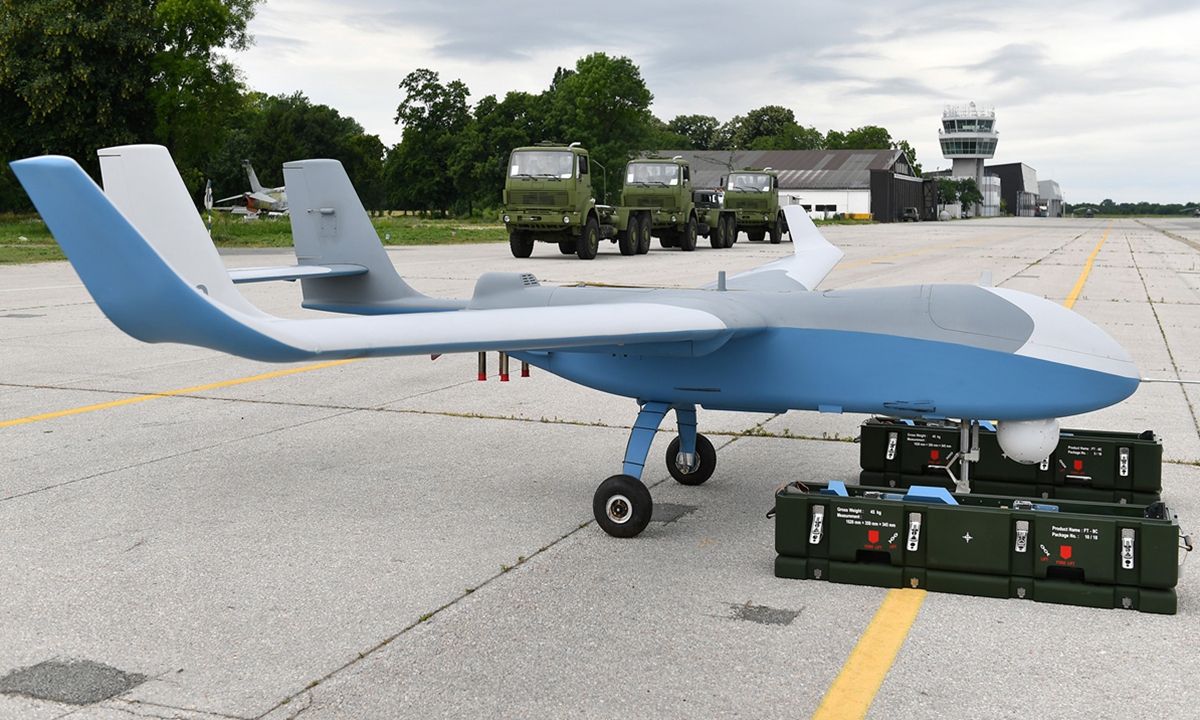
A CH-92A armed reconnaissance drone is delivered to Serbia. Photo: Website of Serbia's Ministry of Defense
In early July, Serbia officially inducted six Chinese CH-92A attack/reconnaissance drones into the country's armed forces. The country will also be purchasing Chinese-made FK-3 air defense missile system, export version of the HQ-22 system, in the near future.
This makes Serbia the first European country to deploy Chinese unmanned aerial vehicles. The move opens up new channels for China to break into the European arms market.
These deals have Western countries, especially NATO members led by the US, worrying about closer ties between Beijing and Belgrade. But their worries are totally excessive and redundant.
First of all, it is necessary for Serbia to maintain its national security, and it needed to purchase advanced defense weapons. Memories of the Kosovo War in the late 1990s when NATO unilaterally attacked the Federal Republic of Yugoslavia and caused great economic losses still run strong. The Kosovo War, which ended in the defeat of the Serbs, is a modern, regional war with a profound background that has had wide-ranging influences.
Serbia has always believed that if Yugoslavia had advanced armed reconnaissance drones in 1999, its air force could have taken the initiative instead of waiting to be bombed. Similarly, if Yugoslavia had advanced air defense missiles such as the HQ-22 Surface-to-Air, NATO would not have the opportunity to carry out a large-scale air attacks lasting 78 days.
But Serbia's military budget was limited. In 2019, Serbia's military expenditures were only $1.14 billion and they had no hope to afford Russia's S-400 air defense missile. The system China has provided is a good deal that is better suited to Serbia's needs for striking aerodynamic targets instead of simply having an anti-missile set-up.
The purchase is pragmatic since Serbia has actively wanted to join the European Union since 2010 to further ease tensions with its neighboring countries.
Second, China's export of weapons overseas is in full compliance with the provisions of international laws. On July 6, 2020, China completed all legal procedures for its accession to the Arms Trade Treaty. This move shows that China tries to maintain global and regional peace and stability, and actively participates in the governance of the global arms trade. It also reflects China's efforts to safeguard the international arms control system.
As a country engaged in normal trade of military products, China has always exercised strict controls and management over all military exports. It has a complete set of domestic policies and regulations on military exports. China's own military trade policies and management measures not only meet the requirements of international treaties, but they also far exceed those requirements. For example, China only exports military products to sovereign states and will never export military products to non-state actors. All the above mentioned details show that China's exports of conventional military equipment to Serbia fully meet the requirements of the Arms Trade Treaty.
Third, the global arms market needs fair competition. China has the right to export advanced weaponry. The US has always been the world's largest arms exporter, accounting for more than one third of the world's total arms exports in the past five years. Russia ranks second with its arms exports accounting for a fifth of global arms shipments. France is in third place, which accounts for about 8 percent of the world's arms exports. Germany and China are also among the top five arms exporters in the world.
Although China ranks fifth, there is a huge gap between China's market share and that of the US. What's more, China's market of arms exports is mainly concentrated on some developing countries in Asia, Africa and Latin America.
The US opposes China's entry and rise in more developed Western arms markets out of a political "double standard" mentality. Yet China trades with ethics and calls on all parties to never export conventional weapons to non-state actors and not to interfere in the internal affairs of sovereign states by taking advantage of conventional arms exports. Beijing believes that with the passage of time and an improved reputation for high-quality weapons, China's conventional arms can gain more market shares sooner or later.
The author is a Chinese military expert and commentator.









